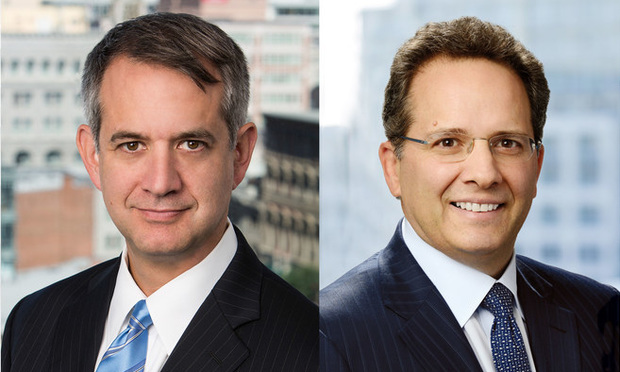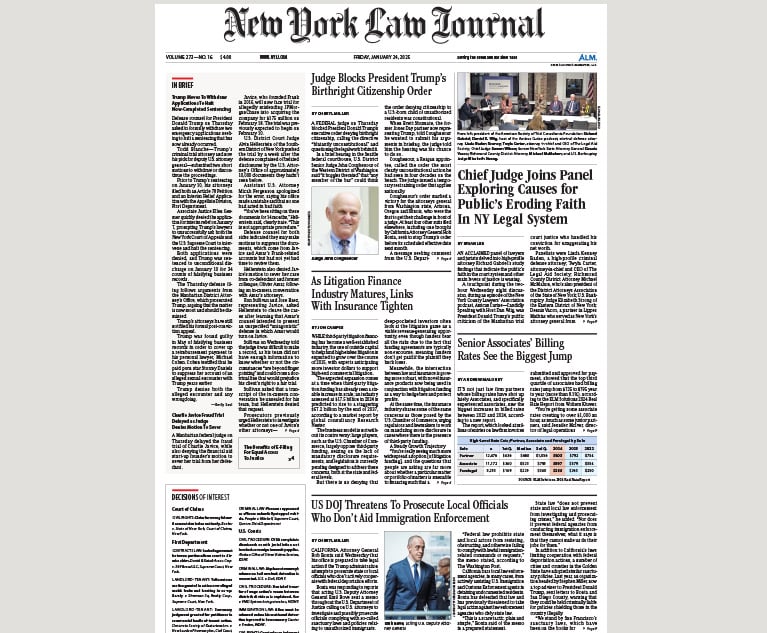Venable Adds 100 Lawyers in Merger With New York's Fitzpatrick Cella
The deal with prominent IP boutique Fitzpatrick, Cella, Harper & Scinto creates an 800-lawyer firm with a major presence in New York City.
August 21, 2018 at 03:00 PM
6 minute read
The original version of this story was published on The American Lawyer
 Stu Ingis, with Venable, left, and Dominick Conde, with Fitzpatrick, Cella, Harper & Scinto, right.
Stu Ingis, with Venable, left, and Dominick Conde, with Fitzpatrick, Cella, Harper & Scinto, right.
Washington, D.C.-based Venable is combining with New York-based intellectual property firm Fitzpatrick, Cella, Harper & Scinto, doubling the size of Venable's New York office to more than 170 lawyers.
Lawyers from Fitzpatrick will formally join Venable on Nov. 1, a Venable spokeswoman said. The combined firm's revenue is expected to top $620 million, including more than $79 million from Fitzpatrick.
Venable is one of the few Am Law 100 firms that has not seen a single year of declining profitability or per-lawyer revenue in the last decade, and the combination positions the firm to move up several places in the Am Law 100 rankings.
The merged firm will boast approximately 800 total attorneys, which would make it one of the 50 largest firms in the country in terms of total lawyer head count as measured by ALM. Venable now ranks as 69th largest firm in the 2018 NLJ 500.
All 104 lawyers from Fitzpatrick are making the move, said Dominick Conde, chair of the firm's management committee. Those lawyers will practice under the name Venable Fitzpatrick, at least initially, while Venable will not change its name.
“We've got a longstanding commitment both to New York and to the IP practice,” said Stu Ingis, Venable chairman, calling the merger “a home run for us.”
In doubling the size of its Washington office, Venable joins a group of large Washington-area law firms that also boast sizable New York offices, including Covington & Burling, Hogan Lovells, and Wilmer Cutler Pickering Hale and Dorr. In terms of New York-facing Washington firms, however, Venable still trails well behind Arnold & Porter Kaye Scholer. The 2017 merger between D.C.'s Arnold & Porter and New York's Kaye Scholer produced a firm with revenues approaching $1 billion.
Ingis cited the added size in New York as one benefit to the merger for Venable, which is currently the 12th largest firm in Washington as measured by attorney head count.
'Doubling Down' on IP
While some large, full-service firms are paring back their patent prosecution practices or spinning off patent groups, Ingis said the merger shows “we obviously are doubling down on our commitment.” Once the combination closes, Venable said it will have about 175 intellectual property lawyers, making it one the largest IP groups in the country.
“Almost every client has legal needs in the IP space” and Venable will capture more work as an IP powerhouse, Ingis said.
Venable can benefit from Fitzpatrick's strong pharmaceutical practice, while Venable has a prominent products liability practice that will benefit from the merger, Conde said. “We looked at it at a pretty granular level to identify those opportunities,” he said.
The deal marks Venable's largest single acquisition, but it has a history of adding groups of lawyers. In 1999, it added about 55 lawyers from Washington-based Tucker Flyer. Fitzpatrick has never undergone such a large combination and rarely sees a lateral move.
Venable and Fitzpatrick lawyers got to know each other better when working together several years ago on a patent litigation case in Baltimore. “The conversations a couple years ago were very brief,” but last fall the firms' lawyers began having more serious merger discussions, Conde said.
Boutique Viability
The deal is the latest step toward the extinction of large IP firms in New York. In recent decades, a slew of IP firms have shuttered or have been acquired in Manhattan, including Kenyon & Kenyon; Pennie & Edmonds; Fish & Neave; Morgan & Finnegan; Darby & Darby; and Brumbaugh, Graves, Donohue & Raymond.
Fish & Richardson is now the most prominent, largest IP boutique left standing in Manhattan.
In 2016, Nicholas Cannella, a senior member of Fitzpatrick's management committee who is now a retired partner, expressed dismay when asked about Kenyon's demise, but he insisted that any combination with a full-service firm was not in the works for his firm. “We are IP and IP alone,” Cannella said then.
Two years later, Conde on Tuesday dismissed any similarities between Fitzpatrick's combination with Venable and other IP boutique mergers. “Every one of those boutiques that merged had their own particular circumstance,” he said.
Asked what has changed in the last two years, Conde said Fitzpatrick began having more conversations with Venable and began “thinking about the legal market.”
“The Kenyon situation was different from ours in a very significant way,” in that Kenyon was having some hard times, Conde said. “In contrast, we're in a really strong position. We're busy and we're seeing a lot of growth.”
Fitzpatrick, which also has offices in California and D.C., lost more than 25 percent of its total lawyer head count from 2016 to 2017, according to ALM data. Conde attributed some of that to retiring partners and said total lawyer head count had remained stable in 2018.
“I think our firm could have been viable,” Conde said about his firm's prospects absent the merger.
“You're viable right now,” Ingis quickly interjected in a joint interview.
Conde said because the firm has not had lateral hires or undertaken combinations in its past, others in the firm “understandably had questions.”
After slowly bringing people into the loop and introducing them to their Venable counterparts, Conde said the Fitzpatrick team felt “really comfortable.” He noted the firms share similar values and culture as well as some common clients, including the pharmaceutical giant Merck.
“It was very important, if we were going to combine with another firm, that we fit the culture and the practice,” Conde said. “The fit is exceedingly good.”
This content has been archived. It is available through our partners, LexisNexis® and Bloomberg Law.
To view this content, please continue to their sites.
Not a Lexis Subscriber?
Subscribe Now
Not a Bloomberg Law Subscriber?
Subscribe Now
NOT FOR REPRINT
© 2025 ALM Global, LLC, All Rights Reserved. Request academic re-use from www.copyright.com. All other uses, submit a request to [email protected]. For more information visit Asset & Logo Licensing.
You Might Like
View All
Paul Hastings, Recruiting From Davis Polk, Adds Capital Markets Attorney
3 minute read
Neighboring States Have Either Passed or Proposed Climate Superfund Laws—Is Pennsylvania Next?
7 minute readTrending Stories
Who Got The Work
J. Brugh Lower of Gibbons has entered an appearance for industrial equipment supplier Devco Corporation in a pending trademark infringement lawsuit. The suit, accusing the defendant of selling knock-off Graco products, was filed Dec. 18 in New Jersey District Court by Rivkin Radler on behalf of Graco Inc. and Graco Minnesota. The case, assigned to U.S. District Judge Zahid N. Quraishi, is 3:24-cv-11294, Graco Inc. et al v. Devco Corporation.
Who Got The Work
Rebecca Maller-Stein and Kent A. Yalowitz of Arnold & Porter Kaye Scholer have entered their appearances for Hanaco Venture Capital and its executives, Lior Prosor and David Frankel, in a pending securities lawsuit. The action, filed on Dec. 24 in New York Southern District Court by Zell, Aron & Co. on behalf of Goldeneye Advisors, accuses the defendants of negligently and fraudulently managing the plaintiff's $1 million investment. The case, assigned to U.S. District Judge Vernon S. Broderick, is 1:24-cv-09918, Goldeneye Advisors, LLC v. Hanaco Venture Capital, Ltd. et al.
Who Got The Work
Attorneys from A&O Shearman has stepped in as defense counsel for Toronto-Dominion Bank and other defendants in a pending securities class action. The suit, filed Dec. 11 in New York Southern District Court by Bleichmar Fonti & Auld, accuses the defendants of concealing the bank's 'pervasive' deficiencies in regards to its compliance with the Bank Secrecy Act and the quality of its anti-money laundering controls. The case, assigned to U.S. District Judge Arun Subramanian, is 1:24-cv-09445, Gonzalez v. The Toronto-Dominion Bank et al.
Who Got The Work
Crown Castle International, a Pennsylvania company providing shared communications infrastructure, has turned to Luke D. Wolf of Gordon Rees Scully Mansukhani to fend off a pending breach-of-contract lawsuit. The court action, filed Nov. 25 in Michigan Eastern District Court by Hooper Hathaway PC on behalf of The Town Residences LLC, accuses Crown Castle of failing to transfer approximately $30,000 in utility payments from T-Mobile in breach of a roof-top lease and assignment agreement. The case, assigned to U.S. District Judge Susan K. Declercq, is 2:24-cv-13131, The Town Residences LLC v. T-Mobile US, Inc. et al.
Who Got The Work
Wilfred P. Coronato and Daniel M. Schwartz of McCarter & English have stepped in as defense counsel to Electrolux Home Products Inc. in a pending product liability lawsuit. The court action, filed Nov. 26 in New York Eastern District Court by Poulos Lopiccolo PC and Nagel Rice LLP on behalf of David Stern, alleges that the defendant's refrigerators’ drawers and shelving repeatedly break and fall apart within months after purchase. The case, assigned to U.S. District Judge Joan M. Azrack, is 2:24-cv-08204, Stern v. Electrolux Home Products, Inc.
Featured Firms
Law Offices of Gary Martin Hays & Associates, P.C.
(470) 294-1674
Law Offices of Mark E. Salomone
(857) 444-6468
Smith & Hassler
(713) 739-1250








